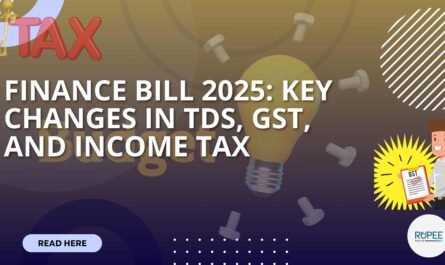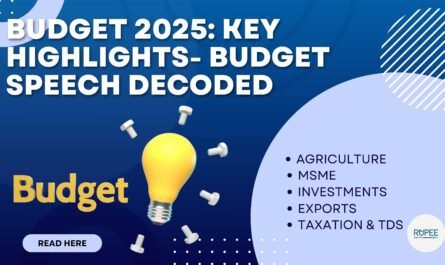India’s Economic Survey 2025: Key Insights & Policy Roadmap
India’s Economic Survey 2025, released by the Ministry of Finance, provides a comprehensive analysis of the country’s economic performance, challenges, and future prospects. The survey emphasizes sustainable growth, investment-friendly policies, digital transformation, and employment generation. Here are the major takeaways in a quick and easy list format.
1. India’s Growth Story: Strong & Steady
✅ GDP Growth: India remains one of the fastest-growing major economies.
✅ Resilience Amid Global Challenges: Despite inflation, geopolitical tensions, and trade disruptions, India maintains strong macroeconomic stability.
✅ Projected Growth Rate: Estimated between 6.3% – 6.8% for FY 2025-26.
2. Fiscal & Financial Health: Strengthening Stability
✅ Fiscal Deficit Under Control: The government remains committed to fiscal discipline and lowering deficit levels.
✅ Tax Revenues on the Rise: GST collections and direct tax revenues show positive growth.
✅ Healthy Banking Sector: NPAs (Non-Performing Assets) decline, credit growth improves.
✅ Retail & Institutional Investments: Indian markets attract foreign and domestic investors.
3. Inflation & Price Stability: A Mixed Bag
✅ Food Inflation Concerns: Rising prices of essential commodities like onions, tomatoes, and pulses.
✅ Core Inflation Stable: Monetary policies by RBI help keep inflation under check.
✅ Government Interventions: Policies to stabilize agricultural prices and increase supply chain efficiency.
4. Infrastructure Boom: Fueling Growth
🏗 Increased Government Capex: Higher spending on roads, railways, and urban infrastructure.
🚄 Railways & Metro Expansion: Faster project execution in urban transport.
📶 Digital Connectivity: Push for 5G expansion and rural broadband access.
⚡ Renewable Energy Drive: Investments in solar, wind, and green hydrogen projects.
5. Industrial Growth & MSME Boost
🏭 PLI (Production-Linked Incentive) Scheme Expansion: Encouraging manufacturing in key sectors.
🛠 MSME Reforms: Easier financing, credit guarantees, and digital support for small businesses.
🔬 Innovation & R&D: Focus on technology-driven industries and startups.
6. External Sector: Trade & Investment Trends
🌍 Exports Face Global Headwinds: Due to geopolitical tensions and trade restrictions.
💰 Foreign Direct Investment (FDI): Stable inflows despite global uncertainties.
🛡 Trade Policies: India takes steps to counter restrictive trade measures like the EU’s CBAM (Carbon Border Adjustment Mechanism).
📉 Current Account Deficit (CAD): Sustainable levels despite global slowdowns.
7. Services Sector: A Powerhouse of Growth
💻 IT & Digital Economy: Continued dominance of India’s software and tech services exports.
📦 Logistics & E-Commerce: Government initiatives improving supply chain efficiencies.
🏨 Tourism & Hospitality: Infrastructure boost under schemes like Swadesh Darshan.
8. Agriculture & Rural Economy: Modernization Drive
🌾 Technology in Farming: Push for AI-based solutions, smart irrigation, and mechanization.
💵 Higher Credit for Farmers: Increased agriculture loans and crop insurance expansion.
🏭 Food Processing Industry Growth: Incentives for food exports and FPOs (Farmer Producer Organizations).
🌱 Sustainability Focus: Climate-resilient farming initiatives.
9. Climate & Energy: Transitioning to Green Growth
☀ Solar & Wind Energy Expansion: Focus on domestic manufacturing of solar panels.
🔋 Green Hydrogen Mission: Investments in clean energy storage solutions.
🌎 Climate Adaptation Policies: Strengthening disaster management for extreme weather events.
10. Employment & Skill Development: Preparing for the Future
👩💻 AI & Automation Challenges: India looks at balancing job losses and job creation.
🎓 Skill Development Initiatives: Focus on upskilling in AI, fintech, and digital sectors.
🛠 Rise of the Gig Economy: Government working on social security measures for gig workers.
11. Social Sector & Welfare Initiatives
🏥 Healthcare Growth: Expansion of Ayushman Bharat, rural healthcare centers, and mental health programs.
📚 Education & NEP Implementation: Strengthening vocational training and higher education reforms.
👩🔬 Women & Youth Empowerment: Financial inclusion, job opportunities, and legal reforms for gender equality.
12. Governance & Ease of Doing Business
⚖ Deregulation & Policy Reforms: Reducing bureaucratic red tape.
📄 Simplified Tax Compliance: GST system becoming more streamlined.
🏢 Startup Ecosystem Strengthened: New initiatives for funding, mentorship, and incubation support.
Final Thoughts: The Road Ahead for India
India’s Economic Survey 2025 outlines a balanced and forward-looking approach to economic growth. With strong investments, stable policies, and technological advancements, the country is well-positioned for sustainable development. The focus remains on infrastructure, industry, digital economy, and social welfare, paving the way for a $5 trillion economy in the coming years.
“Your habits will determine your future.” – Jack Canfield




